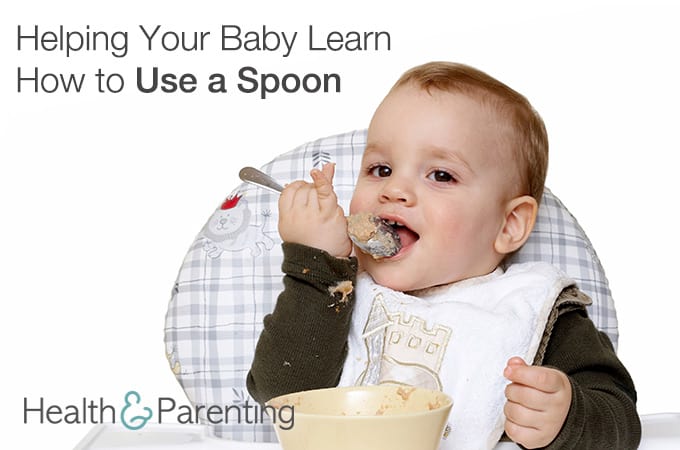Now that your baby is getting older, he’s probably quite insistent on doing things for himself. He may become frustrated if not given the opportunity to master new skills. This is a taste of things to come, when he’s a toddler, he’ll be fighting for his independence every day. However, your baby may become frustrated when he discovers he can’t do everything all by himself. If you want to help your baby learn how to use a spoon, the following pointers may help:
- Practice makes perfect
Incorrect spoon feeding is messy, I know. Your baby is likely to have more soup on his head than in his tummy by the end of the meal. The spoon will catapult yoghurt onto your kitchen walls and your baby will probably accidentally spoon food onto the floor instead of into his mouth. It’s not going to be much fun, but will provide ample photo opportunities. Whilst it would be much easier and quicker to simply spoon feed your baby yourself, it won’t help your child master the spoon. Practice makes perfect with this one. Give your baby plenty of opportunity to practice using a spoon and, in time, he’ll get it.
- Teach by example
Whilst your baby is busy flinging blueberry yoghurt at the wall, why not sit next to him (not too close, mind) and enjoy a yoghurt yourself. Your baby will be able to see how you use the spoon and, hopefully, be able to try and mimic what you’re doing. Don’t expect him to get it right first time, though, remember he’s still working on his dexterity so might find maneuvering the spoon tricky for a little while longer.
- Use sticky foods
Soup will simply slide off the spoon each time your baby tips it (a lot), so your baby may end up feeling quite frustrated. If you use sticky foods, these will cling to the spoon even when your baby holds it the wrong way up. Oatmeal, mashed vegetables and mac and cheese are good examples of foods that possess a little more staying power.
- Make it fun
These early mealtimes could affect your child’s future relationship with food. For this reason, it’s important to keep mealtimes as fun as possible. Don’t get stressed or upset if (read: when) your baby is making a mess or hasn’t eaten as much as you’d hoped. Remember, mealtimes are about so much more than eating at this age. Your baby is learning and exploring too.
Written by Fiona (@Fiona_Peacock), mother, writer and lover of all things baby related.
This information is not intended to replace the advice of a trained medical doctor. Health & Parenting Ltd disclaims any liability for the decisions you make based on this information, which is provided to you on a general information basis only and not as a substitute for personalized medical advice. All contents copyright © Health & Parenting Ltd 2016. All rights reserved.










